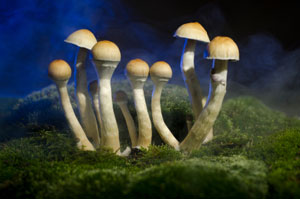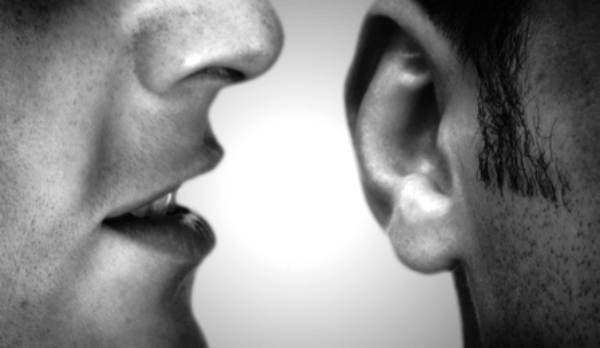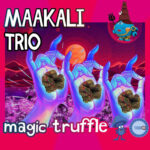Psilocybin (the psychedelic compound in magic mushrooms and truffles) has been scientifically exonerated from its unfair label of ‘dangerous drug’. Studies are showing time, and time again, that the medicinal and therapeutic benefits of psilocybin (and other psychedelics like, LSD, DMT, MDMA, ayahuasca and ibogaine) are poised to change the world for the better, spearheading a mental health treatment revolution.

Urban Legends And Fake News
However, despite all the fanfare, furore and the cold hard facts, some people still find it hard to accept that a substance that their parents and teachers warned them against could actually be good. Great, even! It’s understandable. Those who never sought out mischief — or just didn’t get the opportunity — have never heard positive stories about psychedelics. About how they can open your mind, free you from anxiety, bring you closer to nature, give you a burst of love, and to top it off are just a wildly good time. Many people just hear the horror stories, urban legends and fake news that flies around — that guy on acid who thought he was an orange! — etc, etc.

Stories like these are patently untrue, but they do do the job of scaring the bejeesus out of teenagers who might be considering taking psychedelics. If you don’t have anyone with the facts to go to, how can you ever learn what’s what?
And so, we’ve collected and answered some of the most frequently asked questions in relation to psychedelics and mental health — in honour of both World Mental Health Day, and in honour of you. Only when you have the real facts can you make an educated and informed decision if psychedelics are for you. Read on while we bust some myths….
Can Psychedelics Cause Mental Health Issues?
A study published in the Journal of Psychopharmacology in 2015, categorically put to bed the idea that psychedelics, like magic mushrooms, can cause mental health problems. In a sample size of 19,000 psychedelics users, researchers found “no associations between lifetime use of psychedelics and increased likelihood of serious psychological distress.”. In fact a link was even found between psychedelic use and good mental health.
Of course this doesn’t mean that bad trips aren’t possible. If you go into your psychedelic journey feeling uncomfortable or unhappy, you may have a less positive experience. However, this is temporary. There will be no lasting negative psychological effects. And, in fact— people who experience these so-called ‘bad trips’ often report positive changes and feelings in the aftermath.
Finally, there is a caveat here. That although psychedelics do not CAUSE mental health issues, they can potentially exacerbate ones that do already exist. For example, if a person suffers from serious schizophrenia it is not recommended that they take psychedelics. Any mental health condition that lessens your bonds with reality is probably not a good fit. But then, if you are someone suffering from schizophrenia it’s probably recommended you do not drink alcohol either. In these cases, caution and common sense is needed.
Are Magic Mushrooms Addictive?
Despite the common belief that magic mushrooms are addictive, the science shows they are most certainly not. This idea came with the clumsy lumping together of psychedelics with all other drugs such as cocaine and heroin, which are habit forming. In fact, magic mushrooms are now being studied to treat addiction to other substances like nicotine or alcohol. If you need any more convincing, take the esteemed Professor David Nutt’s word for it;
“The United Nations say they’re addictive, the FDA say they’re addictive, the Misuse of Drugs Act says they’re harmful and addictive. These drugs are anti-addictive. They do not cause addiction. One of the reasons they are banned is because people said they were addictive when they’re not; they treat addiction. They don’t cause addiction. The reason they don’t cause addiction is partly because they treat addiction and partly because they produce a very rapid tolerance or desensitization and that occurs so fast that people stop using.”
Are Magic Mushrooms Toxic?
Again, it’s a resounding NO. While of course people do get poisoned by mushrooms, for example if they are foraging without a guide and mis-identify a shroom — sure. But psychedelic mushrooms like the Psilocybe cubensis from our grow kits are non-toxic, just intoxicating (and that’s a good thing!) In fact a recent study showed that magic mushrooms are the safest recreational drug — you can’t really overdose. Brad Burge of MAPS states;
“There is no known lethal dose for LSD or pure psilocybin,”.
It’s more sensible to worry about ‘overdosing’ on antidepressants, alcohol, or even salt!
What Mental Health Conditions Can Psychedelics Help With?
Research into the therapeutic uses of psychedelics has found they can help treat a diverse range of mental health conditions. With many of them, such as psilocybin, being rushed through by previously sceptic organisations like the FDA as a breakthrough treatment. This is all very exciting for sufferers of:
Treatment resistant depression, depression, PTSD, OCD, addictions issues, postpartum depression, traumatic brain injury, end-of-life anxiety, general anxiety disorders, eating disorders, and more.
Can People Using Other Medications For Mental Health Take Psychedelics?
There has been research into the effects of psychedelic treatment, when taken in conjunction with common antidepressant or anxiety medications. SSRIs (selective serotonin reuptake inhibitors) make up 80% of prescribed antidepressants, and unfortunately for those taking them who want to also try shrooms, reports say there could be a problem. Some studies have found that SSRIs blunt or reduce the effects of psilocybin treatment. Psilocybin retreats in The Netherlands and Jamaica will not take people on for treatment if they are currently taking SSRIs. This then means the decision to taper off SSRI treatment has to be reckoned with.
Unlike shrooms, SSRIs do have addictive qualities and physical withdrawal. This means that coming off SSRIs needs to be done with supervision or help. And, definitely only after discussing it with your doctor. However, even then, some researchers believe that previous SSRI use could continue to dampen effects — which is a cruel irony for those who need this treatment most.
On the bright side, there are some experts who have not found evidence to support this worry. This includes Dr Mathew Johnson from the John Hopkins University. He states;
“Anyone with that chronic use history (of SSRIs) would have had to go off for several weeks before a session. In terms of someone still having a blunted response even after that period, we have not specifically analyzed this, but I doubt if there is anything substantial as we’ve seen many cases of powerful sessions with folks in that situation.”
Finally, although there is cause to think SSRIs could inhibit the effects of psilocybin, there is no evidence to suggest that combining the two is harmful.
How Long Do The Effects of Psilocybin Last On Your Mental Health?
This is one of the most fascinating and promising elements in relation to shrooms and mental health — the lasting effect. Even though your body metabolises psilocybin within 24 hours, the fabled ‘afterglow’ is very much a real thing, with users reporting sustained good mood, long after the effects of the drug itself has worn off. Additionally, studies have found that even one psychedelic trip is enough to reset some people’s outlook on life, to a more positive spin, forever. Many people who have had psychedelic experiences rank them as one of the most important events of their lives.
This is great news for those who are currently taking antidepressants or anti-anxiety meds. The dosage and the price is constant and can be damaging. Magic mushrooms can be taken much less regularly. In some cases people stop taking them when they feel they are in ‘remission’. This is something impossible with traditional pills.
How Can A ‘Party Drug’ Be A Medicine?
This is a bit of a silly one. A trick question. Because really it’s a misconception that magic mushrooms are ‘party drugs’. Sure, you can take them at a party. But, then it’s much more likely you and your shroomy friends will lie back and have some trippy heart-to-hearts and giggles rather than dance the night away. By lumping them in with excessive drinking or stimulants like speed or cocaine, the powers-that-be made sure that psychedelics were not taken seriously as the medicines that they truly are.
We hope that this FAQ/ myth-busting sesh has given you the answers you need about psychedelics and mental health. If you have any burning questions, let us know in the comments below!

And for more general FAQs we have some excellent blogs that can answer them — such as:
How To Take Shrooms For The First Time
Happy learnin’! And remember — share the knowledge!





